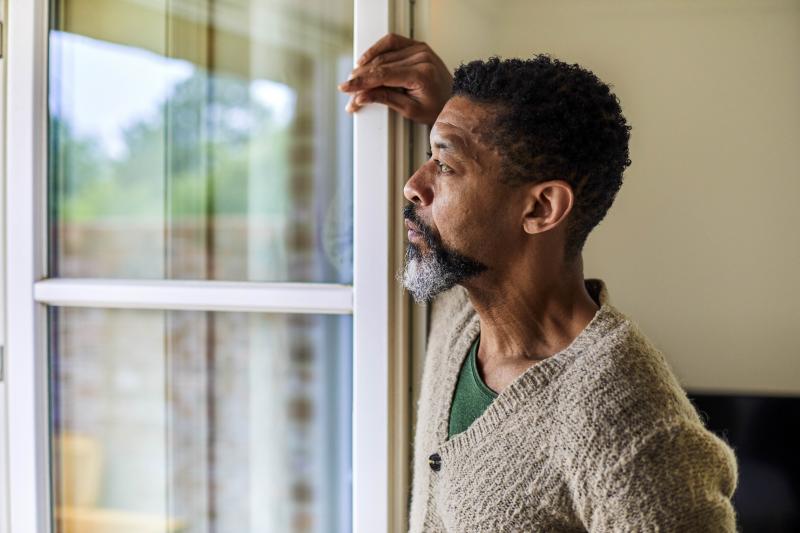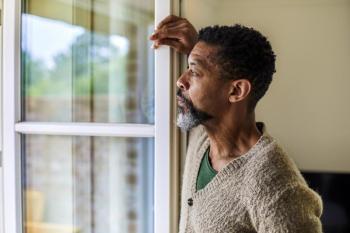For Mainers in recovery, isolation presents a unique challenge
For Jason Trahan, a 43-year-old Lewiston resident in recovery from substance use, living in physical isolation during the COVID-19 pandemic is both a comfort and a challenge.
“I can deal with this isolation, because I used to love isolation,” he told Beacon.
But this tendency is very much tied to Trahan’s past substance use, when he said he’d find comfort in being alone after using drugs.
For Trahan and others in recovery, the struggle of living without direct contact with other people coupled with a potential loss of routine because of the pandemic can be triggering.
“I have to be careful,” he said, “because it can bring back some other ideas.”
Trahan has been in recovery for three years. He says many of those newer to recovery, like the men in his local support group that have only been in recovery for a few months, have had a “really tough time” with the transition to remote living.
“A lot of them are in a drug court, on probation, or just out of prison or jail,” said Trahan. “They’re struggling, because they don’t have to go to probation, but they have to do this, they have to do that. [Their schedule] is all different.”
For some of his recovery peers, the situation has caused them to return to substance use.
A loss of community
Dani Fazio, a Licensed Clinical Social Worker and Certified Alcohol and Drug Counselor, works for herself in private practice at Therapy For The People in Portland, as well as at Crossroads, a behavioral health agency in Scarborough. Three days a week, she facilitates an intensive outpatient program for women with substance use disorder, providing a space for these women to be “in community” with each other when they may otherwise have no one.
When COVID-19 was first detected in Maine in early March, the physical community these women had at Crossroads Maine transitioned online. March 13 was the last time they saw one another in person. At that point, Fazio said she developed “an increased level of concern for” her clients.
Fazio’s long-time belief in making recovery “portable” helped her to adapt the program to bring the women together virtually. Fazio said she has always asked her group members to consider what they require to stay sober, having them ask themselves: “‘How can I keep sober, healthy, and connected, and well no matter where I am, no matter what the circumstances are?”
The virtual meetings have so far been successful, she said.
Fazio believes this moment has allowed her clients to learn to recognize what is in their control, as well as what’s not in. They have had to be willing to try something new, like a virtual meeting, even if they didn’t feel they had the skills to do it, she said.
Fazio says she has been adapting as well.
“I knew that what was in my control was supporting people in recovery from a distance, and maintaining a sense of community and connection,” Fazio said. “As providers, we have to be willing to shift how we provide services, so that we can continue to support the recovery community.”
‘People in recovery are resilient. Period.’
Trahan developed a substance use disorder at 21 while attempting to manage the pain from a job-related back injury. He used alcohol, cocaine, and eventually opiates for more than 20 years.
Now a few years into his recovery journey, Trahan is working to preserve the routine and community he requires to stay on track throughout the pandemic.
In March, Trahan attended a group hike that — while all the participants kept six feet of space between one another — he says helped strengthen the connection he has with his peers. He also attends recovery meetings every week on the video conference application Zoom and has tried to keep up with his exercise routine.
“I wasn’t following any rules in my life for 20 years. I made my own rules,” he said. “Now, I’m following rules, and trying to do the right things.”
Fazio emphasized that people in recovery should stick to familiar routines and stay digitally connected with others.
But she cautioned that they must also recognize that now “a lot of [their] time has been spoken for” by simply processing and adjusting to what is happening in the world. Fazio added that many people in recovery are better equipped to deal with the current situation than society might think.
“People in recovery are resilient. Period,” Fazio said. “They’re faced with co-existing with triggers every day. So they see the coronavirus, the pandemic, as a really big trigger, and they know that they have to co-exist with it.”
Cara DeRose is a staff writer for Beacon. A graduate of the University of Southern Maine, she served as writer and copy editor for the USM Free Press and interned at the Portland Press Herald.
Event Date
Address
United States





























